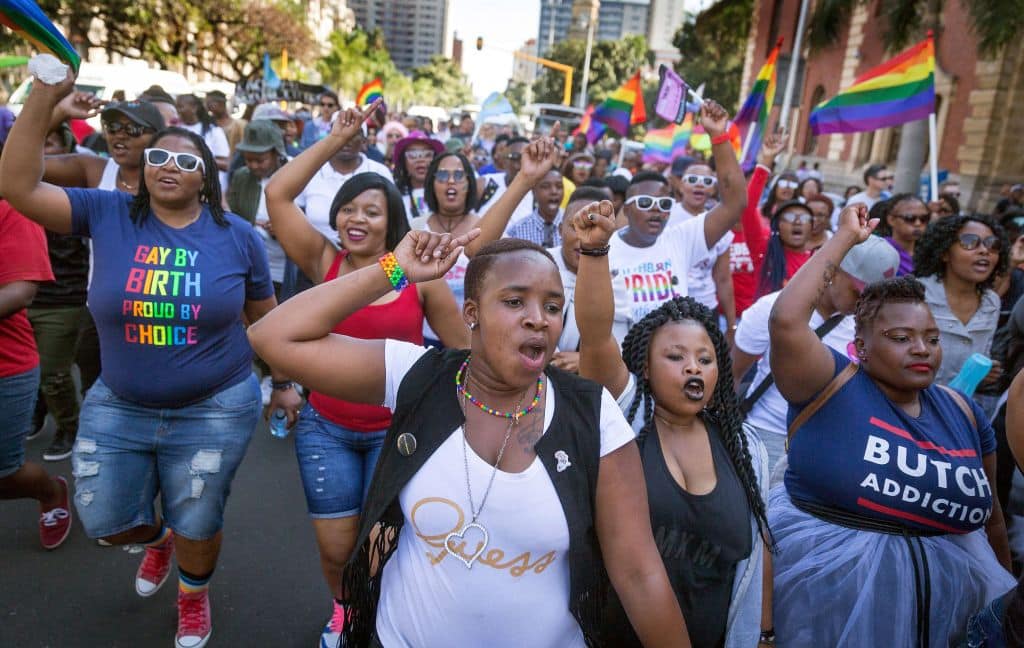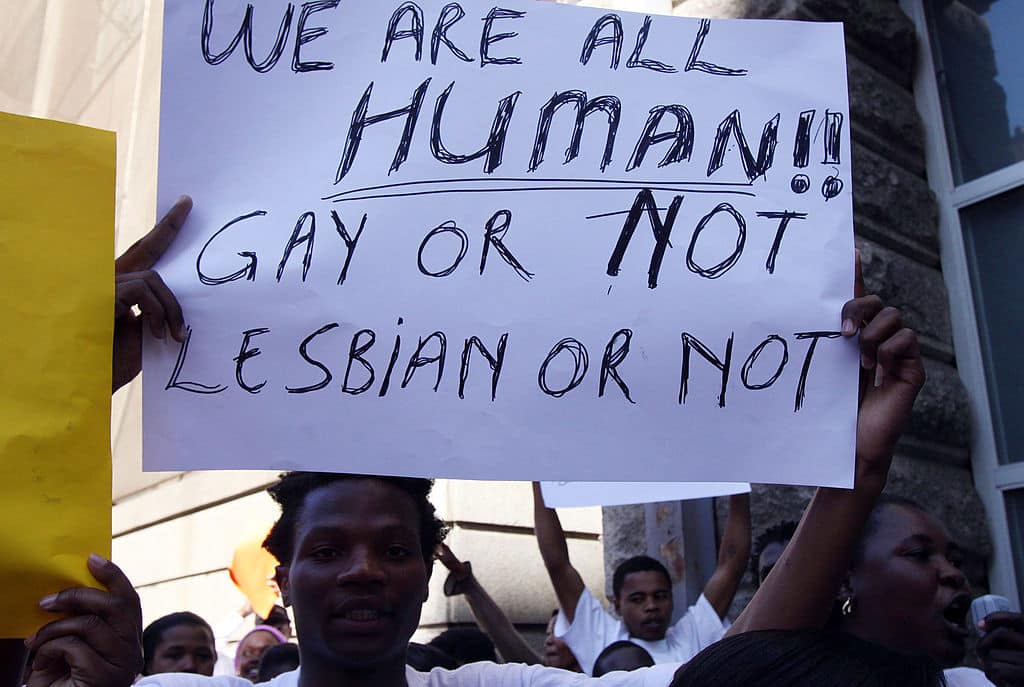Lesbian refugee on fleeing Zimbabwe, finding acceptance and joy of being out
Author: Patrick Kelleher
Developing your first crush as a teenager should be an exciting experience, but for Beverly, it was terrifying.
The problem was that the person she harboured feelings for was a girl. Growing up in Zimbabwe, Beverly knew same-sex relationships were not accepted.
Like so many before her, Beverly tried to convince herself that it was just a phase, but a couple of relationships with men between the ages of 19 and 21 left her with no doubt that she was a lesbian.
That realisation was a painful one for Beverly. Homosexuality is criminalised in Zimbabwe, and public attitudes to queer people are unkind. She knew she could face violence, persecution and discrimination for being openly gay.
In the end, she made the painful decision to pack up her things and flee to South Africa in search of safety. Her journey since then has been at times rocky, but it’s also been life-affirming – and it’s allowed her to live as her authentic self.
Beverly’s story is just one that PinkNews is sharing this holiday season as part of the LGBTQ+ Refugees Welcome campaign.
Over the festive period, PinkNews is sharing stories of LGBTQ+ asylum seekers and refugees from all across the world. Some have found safety, while others are still grappling with harsh asylum systems that are designed to keep refugees out.
LGBTQ+ people have to ‘live a lie’ in Zimbabwe
Beverly had to flee her home country because she could see just how bad things were for LGBTQ+ people there.
She recalls how she forced herself into relationships with men from the age of 19 in a desperate bid to live the traditional life society expected of her.
After just two years of dating men, Beverly found herself a single mother of two children – and she was becoming increasingly aware that her sexuality was not a phase, as she once hoped it was.
Being openly LGBTQ+ in Zimbabwe is “very, very hard”, Beverly says.

“You have to live a lie. When I was dating this woman in Zimbabwe, we had to go around and say we were sisters or we were friends. You can never come out in Zimbabwe.
“The LGBTQ+ community in Zimbabwe, they have to hide. The moment they find out you are part of the community you are over and done with. I had a cousin of mine, she came out as a lesbian and she was sentenced to jail.”
In 2007, Beverly went to South Africa with her daughter and she gradually worked up the courage to come out.
Some of them thought it’s satanic, it’s demonic, that there’s something wrong with me.
“The first person that I came out to was actually my daughter. She was 14-years-old, she saw me hanging out with this woman. I kind of explained to her that she’s not my friend, we are actually dating.
“She quickly embraced me and she was like, mum, as long as you’re happy, I’m happy.”
Everything “fell into place” once her daughter had accepted her as a lesbian, although Beverly did lose some friends when they found out about her sexuality.
“Some of them thought it’s satanic, it’s demonic, that there’s something wrong with me. So I just ended up saying, as long as my family’s OK with me being a lesbian, that’s all that really matters at the end of the day.”
Life was good for Beverly until the COVID-19 pandemic hit, which resulted in her losing her job in hospitality.
It was a turbulent time, but it led Beverly to get involved with the Dream Academy, an initiative which offers classes to those who need them.
After taking classes herself through the Dream Academy, Beverly was given the chance to run her own class on parenting.
“It has been nothing short of amazing,” she says.

Those classes also inspired Beverly to rebuild her relationship with her son, who was raised in Zimbabwe by her sister.
“When I came out, he started rebelling, he would do graffiti in his room, he would spray paint ‘no lesbians in this house’.”
Beverly travelled back to Zimbabwe to meet her son face to face so she could talk to him about his sexuality. The trip was a success – they are now closer than ever.
Beverly’s refugee status was revoked
While Beverly has built a life for herself in South Africa, where she now lives with her partner, she still doesn’t have permanent residency.
When she first arrived in the country, she claimed asylum – but her refugee status was ultimately withdrawn when she briefly travelled home to Zimbabwe to visit a sick family member.
I’ve got friends and family back home who have to live a lie, basically, they just can’t come out.
When she speaks to PinkNews, Beverly only has a guarantee that she can remain in South Africa for a couple more months. She is hoping she will be able to get an extension.
“It’s not a day anytime soon that the LGBTQ+ community is going to be accepted in Zimbabwe, that much I know,” Beverly says.
“I’ve got friends and family back home who have to live a lie, basically, they just can’t come out.
“But for me I am out and proud on my social media – everyone knows – so for me to go back to Zimbabwe into hiding would roll back everything.”
It’s because of people like Beverly that PinkNews launched the LGBTQ+ Refugees Welcome campaign. The initiative is raising funds for Micro Rainbow, a charity that provides safe housing for LGBTQ+ people seeking asylum, and for OutRight Action International’s LGBTIQ Ukraine Emergency Fund, which distributes money to activists on the ground in Ukraine.
This holiday season, PinkNews is sharing the personal stories of refugees and people seeking asylum. The series will put a spotlight on the painful realities LGBTQ+ people across the world face that force them to leave their homes, from familial violence to anti-LGBTQ+ laws.
But that’s not all – the series will also show how a person’s life can change radically when they’re granted asylum. When they can get to safety, LGBTQ+ people have the chance to thrive.
PinkNews wants to show how living without the threat of violence or persecution can help queer people build beautiful, kaleidoscopic lives – but they can only do so if they’re given the proper support.
Please give what you can to the PinkNews LGBTQ Refugees Welcome campaign on GoFundMe. Through GiveOut, we will be directly donating to OutRight Action International’s LGBTIQ Ukraine Emergency Fund, helping the activists and organisations on the ground in Ukraine and surrounding countries to support the needs of LGBTQ+ people turning to them for life-saving help.
Our second beneficiary, Micro Rainbow, creates safe homes where LGBTQ+ asylum seekers from Ukraine, Afghanistan and beyond can be safe while they endure the UK’s gruelling asylum process.
Actual Story on Pink News
Author: Patrick Kelleher





